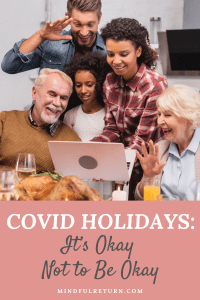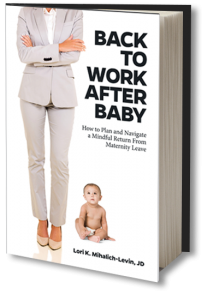 A few months ago, I got a knot in my stomach when I realized the holidays were, once again, practically around the corner. I always get a bit anxious thinking about the holiday season. And this year, of course, that anxiety was exacerbated by the knowledge that it was going to be a “COVID holiday season.” This pretty much meant: all bets are off. We have no idea what life will look like.
A few months ago, I got a knot in my stomach when I realized the holidays were, once again, practically around the corner. I always get a bit anxious thinking about the holiday season. And this year, of course, that anxiety was exacerbated by the knowledge that it was going to be a “COVID holiday season.” This pretty much meant: all bets are off. We have no idea what life will look like.
Being a planner (and worrier) comes naturally to me. So I started exploring the topic early.
At our monthly Mindful Return alumni group call, I picked “holidays” as the topic for us to discuss back in October. I read up on how other countries were handling their own COVID holidays dilemmas. (Check out The In-Laws Will Have to Wait: COVID Forces a Break from Stress-Filled Holiday. This article is about how South Koreans managed Chuseok, their version of Thanksgiving.) I attended a session of Mother Honestly’s Caregiving and Work Summit about parental mental health, where a group of therapists weighed in on this very subject. And I talked to my own therapist.
In short, I did my research.
There are plenty of articles out there right now offering advice on how to navigate the holidays and conversations with family members about them. So I’ll try to avoid being redundant. (Here’s one article I particularly like for its practical scripts: How to Handle That Awkward Family Conversation About the Holidays.) I will, however, summarize here the wisdom I’ve found to be the most helpful to me, personally:
- Holidays are Generally Triggering, Regardless. COVID or no COVID, this seasons is often tangled up in a bunch of conflicting emotions. It’s a time when family dynamics are brought to the surface. And holidays are events against which we tend to benchmark our lives. Just as it helped to remind myself that September was always nutty in its return-to-school challenges, it helps me to remember that big feelings around holiday issues are completely normal.
- Building In Pre- and Post-Holiday Support Is Key to Sanity. For the past (many) years, I have had my own tradition of booking a therapy appointment before and after each of the fall and winter holidays. Just knowing I can rely on that time and space to prepare for and process the events provides me great comfort. Whether it’s a trained professional, a spouse, or a close friend, scheduling some “holiday prep and debrief” sessions can help you hold space for yourself and your own emotions.

- Hold Both Loss and New Meaning at Once: Just as I wrote earlier in COVID, in Holding Pain and Joy In Our Pockets Today, we need to allow space for all the feelings this year. Remember the interplay between the characters Sadness and Joy in the movie Inside Out? So too, do we need to honor and hold both sides here. There is absolutely opportunity to create new rituals and traditions. And we’re also going to feel sadness about what’s missing.
- Make Things Strange and Unfamiliar in a Positive Way. If everything’s going to be different this year, why not go crazy and make it as much about how *you* want it to be, rather than what tradition may have dictated? I recently read about someone who had always dreamed of having a “nothing but side dishes” Thanksgiving (and a “nothing but desserts” Thanksgiving) and was going to give that a whirl this year.
- Clear Conversations Around Expectations Can Help. Take money as one example. In a year when we’ve had both a pandemic and a financial crisis, it may make sense to have more family conversations this year around gift giving and spending. Even within a couple, don’t feel like you need to default to prior practices. Everything about life has changed this year, and being clear with one another can reduce disappointment later on.
- Our Kids *Will* Melt Down. As my own therapist reminded me, kids whose normal schedules are thrown off are developmentally wired to go haywire. It definitely helps me to look ahead to Thanksgiving knowing they’ll go off the rails at one point or another. That way I’m not setting myself – or them – to expect unattainably perfect behavior. And my husband and I can have some strategies up our sleeves to “re-regulate” them when they need it.
- Ditch Judgment. If we’re getting together with family this year, we’re feeling anxious about the virus. If we’re not getting together with family, we’re feeling sad about the loss and perhaps jealous of those who are getting together. Repeat after me: “I’m doing what’s best for my family.” You do you, mama, and let other families do them.
Sigh. This season is tough. This year has been tough. And we are all exhausted. In these times, it is so incredibly okay not to be okay.
In the spirit of American Thanksgiving, I’ll end on a note of gratitude, though. This year, more than ever, I am grateful for my and my family’s health. For toilet paper (who’d have thought!), electricity and WiFi, deep friendships, my kids’ laughter, their teachers, and the roof over our heads.
When all else fails, come back to gratitude.
Want more practical tips on working parenthood? Check out my book, Back to Work After Baby: How to Plan and Navigate a Mindful Return from Maternity Leave


